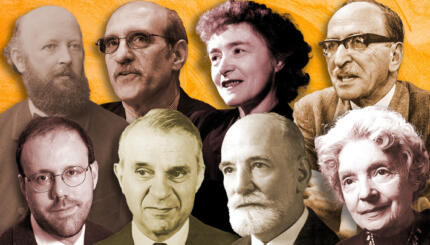Why is it hard to be good? It is a question Jewish thinkers have been asking for more than 1,000 years. While the commandments in the Torah and other Jewish texts are laid out pretty clearly, people often have a hard time following them.
Mussar (also spelled Musar), a Jewish spiritual practice that gives concrete instructions on how to live a meaningful and ethical life, arose as a response to this concern. Mussar is virtue-based ethics — based on the idea that by cultivating inner virtues, we improve ourselves. This is in contrast to most Jewish ethical teachings, which are rule-based. Today, a number of people who do not follow traditional Jewish rules and rituals are attracted to Mussar because it offers opportunities for personal transformation through a Jewish lens.
Mussar masters recognized that simply learning about kindness does not make us more kind. Moreover, they understood that our inner drives, wounds and appetites often manifest as the Yetzer Hara (the Evil Inclination), actively preventing us from behaving as we know we should. One Mussar teacher, Rabbi Elya Lopian (1876-1970), described Mussar as “teaching the heart what the mind already understands.”
History of Mussar
The word Mussar appears in the Bible 51 times, more than half of them in the book of Proverbs. It carried a connotation of ethical instruction according to the teachings of the Torah. In the rabbinic period, texts such as Pirkei Avot carried the thread of personal ethical teachings.
In the medieval period, Mussar became a branch of study focused on virtue ethics (as opposed to rules-based ethics), the practice of working to refine one’s character to become a better person and closer to God.
The seminal works of this era are a chapter in the 10th-century work The Book of Beliefs and Opinions by Rabbi Saadiah Gaon, (written in what is now Iraq) and the first Mussar book, Duties of the Heart, written by Rabbi Bahya Ibn Pakudah in 11th-century Spain. Ibn Pakudah defined Mussar as “the science of the inner life,” and in the introduction, explained that he wrote the book because “no had ever written a book about [the inner life’s] foundations.” He further explained that “the very basis for an act… depends on the intention and inner life of the heart,” which is why we must study the inner world. This thesis was the basis for further exploration by Mussar sages through the present day.
For centuries, Mussar was a field of study and an individual practice. Mussar literature continued grew as scholars from many different Jewish communities wrote practical advice on how to be a better person. However, Mussar books were considered a minor part of the Jewish literature, until the 19th century, when Rabbi Israel Salanter created the Mussar movement.
The Mussar Movement of the 19th Century
Mussar went from individual to community practice under the leadership of Rabbi Israel Salanter in 19th-century Lithuania. Salanter, like many at the time, was concerned that traditional Jewish practice was threatened by the practical acculturation of the Haskalah (Jewish enlightenment), which criticized traditional practice as rote and without meaning. The Mussar movement offered an alternative reformist movement; It retained traditional Orthodox practices, while increasing the focus on personal ethics and moral discipline. Even so, Mussar was not embraced by Jewish traditionalists and leaders of the time.
Salanter endeavored to create a mass movement in society to enable individuals to conquer the Evil Inclination and to serve God wholeheartedly. Salanter and his disciples created a number of innovations to achieve these ends within Judaism. For example, they introduced the idea that each individual has unique spiritual challenges, and thus needs a personalized practice to overcome them. Salanter also introduced practices of introspection and chanting, to achieve emotions sufficient to overcome the negative appetites buried deep within the psyche. Finally, Salanter and his disciples created a new type of yeshiva that took time away from Talmud study in order to allow focus on Mussar study, as well as individualized Mussar practice. For example, students would seek guidance from teachers and fellow students to understand and overcome their particular moral challenges.
By 1939, Mussar had become a significant influence on most of the major yeshivas of Eastern Europe. But almost all these Mussar practitioners and teachers were murdered in the Holocaust. As a result, Mussar was almost lost to the world.
Mussar Today
Today Mussar continues to exist within both the Orthodox and liberal Jewish communities. In some parts of the Orthodox world, Mussar is seen as a cure for poor character. Those who practice Mussar focus on the path towards being pious and saintly, by working on their individual spiritual challenges, building on their high level of Jewish literacy. And it is not uncommon for those within and outside the Orthodox community to simply think of Mussar as a rebuke or advice. While this literal translation of the word Mussar is correct, it misses the lovingly transformative nature of the practice.
As Mussar has become more widely practiced in the liberal Jewish world in the 21st century, many Jews are attracted to the mindfulness aspects of Mussar. Its concepts are universal and can be implemented by people at any level of Jewish literacy. Mussar practitioners focus on a rotating series of Middot, which are soul traits like Humility, Order or Truth. There are three parts to a daily practice: a morning mantra that is read out loud or chanted to frame the day, a mindful action as one goes through the day, and then nightly journaling.
Some Major Mussar Texts
Orchot Tzaddikim (The Ways of the Righteous, 1542, Germany)
This has an anonymous author, was written in Yiddish, and uses a cooking analogy to describe a person’s spiritual makeup, prompting many to speculate it was written by a woman.
Tomer Devorah (The Palm Tree of Deborah, 16th century; Safed, Israel)
This work by Moses Cordovero takes a Kabbalistic (mystical) approach to Mussar, in that it speculates on how our personal choices reverberate in the cosmos.
Mellisat Yesharim (Path of the Just, 1740 Amsterdam)
Moses Chaim Luzzatto wrote this as an explicit guide to become a pious person, who lives beyond the minimal requirements of Halacha. Luzzatto thought that rabbinic students should be taught to focus more on their own personal conduct, and less on the minutia of Talmud.
Cheshbon Ha-Nefesh (An Accounting of the Soul, 1812 Ukraine)
By Rabbi Menachem Mendel Levin, this was the first Mussar book with a systematic program for daily practice. It was influenced by Ben Franklin’s daily virtue practice. The practical day-to-day aspects grow out of Levin’s Haskalah (enlightenment) sensibilities.
Pele Yoetz (1824, Constantinople)
This book by Rabbi Eliezer Papo was studied extensively by a broad population of elites and common people. Its 391 short chapters include practical advice on swearing, sleep, and being balanced in all things.
Ohr Yisrael (The Light of Israel, 1890 Lithuania)
This book by Rabbi Israel Salanter contains many of his letters and essays, including a beautiful letter encouraging those who know Mussar to teach it to others. “You are therefore fortunate that this great Mitzvah of strengthening others in Mussar study came to your hands! It is a magnificent gift.”
Contemporary Mussar Resources
The AishDas Society , The Jewish Women’s Project for Ahavas Yisrael and The International Organization for Mussar Vaadim are Mussar organizations that primarily serve the Orthodox community.
The Mussar Institute, American Mussar (led by Greg Marcus, the author of this article) and the Kirva Institute have books, tools, programs and classes created to be accessible to the entire Jewish community.
Hasidic
Pronounced: khah-SID-ik, Origin: Hebrew, a stream within ultra-Orthodox Judaism that grew out of an 18th-century mystical revival movement.
Talmud
Pronounced: TALL-mud, Origin: Hebrew, the set of teachings and commentaries on the Torah that form the basis for Jewish law. Comprised of the Mishnah and the Gemara, it contains the opinions of thousands of rabbis from different periods in Jewish history.
Torah
Pronunced: TORE-uh, Origin: Hebrew, the Five Books of Moses.
halacha
Pronounced: hah-lah-KHAH or huh-LUKH-uh, Origin: Hebrew, Jewish law.
halachic
Pronounced: huh-LAKH-ic, Origin: Hebrew, according to Jewish law, complying with Jewish law.
yeshiva
Pronounced: yuh-SHEE-vuh or yeh-shee-VAH, Origin: Hebrew, a traditional religious school, where students mainly study Jewish texts.



